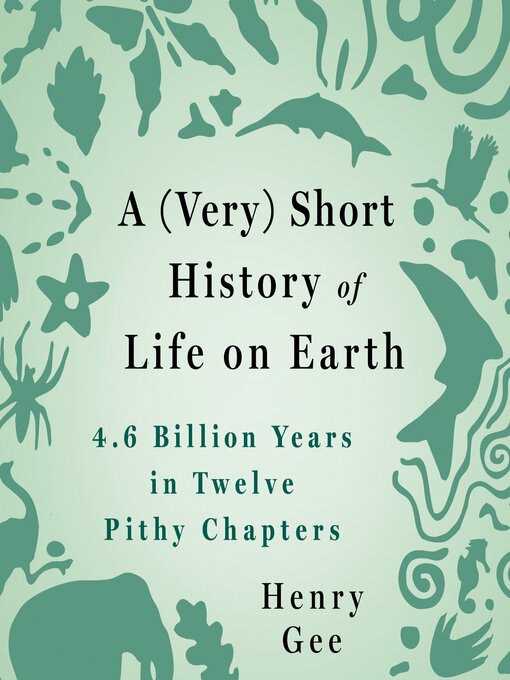The Royal Society's Science Book of the Year
"...Henry Gee presents a pithy, fascinating account of the stages of biological evolution. He's a deliberate, engaged narrator whose slow pacing will require adaptation. This and creative background music and sound effects (dinosaur sounds?) create a meditative and friendly listening experience. From spineless water creatures and egg-laying reptiles to mammals and the great apes, the concise details associated with each evolutionary advance give this audiobook a generous texture."- AudioFile
"[A]n exuberant romp through evolution, like a modern-day Willy Wonka of genetic space. Gee's grand tour enthusiastically details the narrative underlying life's erratic and often whimsical exploration of biological form and function." —Adrian Woolfson, The Washington Post
In the tradition of Richard Dawkins, Bill Bryson, and Simon Winchester—An entertaining and uniquely informed narration of Life's life story.
In the beginning, Earth was an inhospitably alien place—in constant chemical flux, covered with churning seas, crafting its landscape through incessant volcanic eruptions. Amid all this tumult and disaster, life began. The earliest living things were no more than membranes stretched across microscopic gaps in rocks, where boiling hot jets of mineral-rich water gushed out from cracks in the ocean floor.
Although these membranes were leaky, the environment within them became different from the raging maelstrom beyond. These havens of order slowly refined the generation of energy, using it to form membrane-bound bubbles that were mostly-faithful copies of their parents—a foamy lather of soap-bubble cells standing as tiny clenched fists, defiant against the lifeless world. Life on this planet has continued in much the same way for millennia, adapting to literally every conceivable setback that living organisms could encounter and thriving, from these humblest beginnings to the thrilling and unlikely story of ourselves.
In A (Very) Short History of Life on Earth, Henry Gee zips through the last 4.6 billion years with infectious enthusiasm and intellectual rigor. Drawing on the very latest scientific understanding and writing in a clear, accessible style, he tells an enlightening tale of survival and persistence that illuminates the delicate balance within which life has always existed.
A Macmillan Audio production from St. Martin's Press
The Royal Society's Science Book of the Year
"...Henry Gee presents a pithy, fascinating account of the stages of biological evolution. He's a deliberate, engaged narrator whose slow pacing will require adaptation. This and creative background music and sound effects (dinosaur sounds?) create a meditative and friendly listening experience. From spineless water creatures and egg-laying reptiles to mammals and the great apes, the concise details associated with each evolutionary advance give this audiobook a generous texture."- AudioFile
"[A]n exuberant romp through evolution, like a modern-day Willy Wonka of genetic space. Gee's grand tour enthusiastically details the narrative underlying life's erratic and often whimsical exploration of biological form and function." —Adrian Woolfson, The Washington Post
In the tradition of Richard Dawkins, Bill Bryson, and Simon Winchester—An entertaining and uniquely informed narration of Life's life story.
In the beginning, Earth was an inhospitably alien place—in constant chemical flux, covered with churning seas, crafting its landscape through incessant volcanic eruptions. Amid all this tumult and disaster, life began. The earliest living things were no more than membranes stretched across microscopic gaps in rocks, where boiling hot jets of mineral-rich water gushed out from cracks in the ocean floor.
Although these membranes were leaky, the environment within them became different from the raging maelstrom beyond. These havens of order slowly refined the generation of energy, using it to form membrane-bound bubbles that were mostly-faithful copies of their parents—a foamy lather of soap-bubble cells standing as tiny clenched fists, defiant against the lifeless world. Life on this planet has continued in much the same way for millennia, adapting to literally every conceivable setback that living organisms could encounter and thriving, from these humblest beginnings to the thrilling and unlikely story of ourselves.
In A (Very) Short History of Life on Earth, Henry Gee zips through the last 4.6 billion years with infectious enthusiasm and intellectual rigor. Drawing on the very latest scientific understanding and writing in a clear, accessible style, he tells an enlightening tale of survival and persistence that illuminates the delicate balance within which life has always existed.
A Macmillan Audio production from St. Martin's Press


